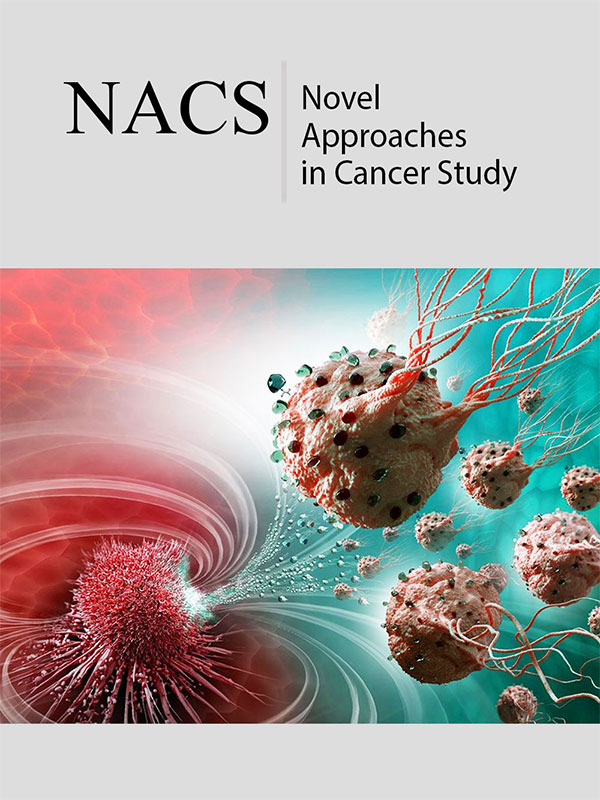- Submissions

Full Text
Novel Approaches in Cancer Study
Natural Killer Cells-based Immunotherapy: Novel Therapeutic Strategy to Halt Triple Negative Breast Cancer
Rana Ahmed Youness*
Department of Pharmaceutical Biology, German University in Cairo, Egypt
*Corresponding author:Rana Ahmed Youness, Pharmaceutical Biology Department, Faculty of Pharmacy and Biotechnology, German University in Cairo, 11835, Cairo, Egypt
Submission: September 03, 2018;Published: September 06, 2018

ISSN:2637-773XVolume2 Issue1
Introduction
Historically, Breast Cancer (BC) has not been considered as an immunogenic tumor, however over the past few years in particular several studies have demonstrated the significance and the high prognostic value of tumor infiltrating lymphocytes (TILs) in several solid tumors including BC [1]. It is worth mentioning that triple negative breast cancer (TNBC) tumors showed a high degree of immune infiltration when compared with hormone receptor positive subtypes. Therefore, clinicians hypothesized that the use of immunotherapy among TNBC patients specially those showing a high degree of TILs could definitely lead to better tumor responses and better eradication of the disease [2]. Moreover, proof-of-principle studies with immune-checkpoint inhibitors in advanced-stage TNBC patients have yielded promising results, proving the potential benefit of immunotherapy for TNBC patients [3].
However, despite the successful unprecedented clinical activity that was reported by the immune checkpoint inhibitors targeting CTLA-4 and the PD-1/PD-L1 axis in several types of cancers including BC through reinvigorating the anti-tumor immune responses by disrupting co-inhibitory T-cell signaling [4]. Yet, the specter of poor clinical responses in some patients had recently appeared in the clinics suggesting the emergence of innate (primary) or acquired (secondary) resistance in those patients [4]. Thus, sheds the light onto the importance of more research directed towards understanding the molecular and immunologic mechanisms underlying the eligibility of TNBC patients towards immune checkpoint inhibitors and also to identify novel therapeutic approaches towards efficient harnessing of TNBC with decreasing the chances of resistance. Thus, recent research has shifted towards innate immune system highlighting the promise of natural killer (NK) cells as a more directed immunotherapeutic approach [5]..
References
- Loi S (2013) Tumor infiltrating lymphocytes, breast cancer subtypes and therapeutic efficacy. Oncoimmunology 2(7): e24720.
- Ibrahim EM, Al Foheidi ME, Al Mansour MM, Kazkaz GA (2014) The prognostic value of tumor infiltrating lymphocytes in triple-negative breast cancer: a meta-analysis. Breast Cancer Res Treat 148(3): 467-476.
- Bianchini G, Balko JM, Mayer IA, Sanders ME, Gianni L (2016) Triple-negative breast cancer: challenges and opportunities of a heterogeneous disease. Nat Rev Clin Oncol 13(11): 674-690.
- Jenkins RW, Barbie DA, Flaherty KT (2018) Mechanisms of resistance to immune checkpoint inhibitors. Br J Cancer 118(1): 9-16.
- Lowry LE, Zehring WA (2017) Potentiation of natural killer cells for cancer immunotherapy: A review of literature. Front Immunol 8: 1061.
© 2018 Rana Ahmed Youness. This is an open access article distributed under the terms of the Creative Commons Attribution License , which permits unrestricted use, distribution, and build upon your work non-commercially.
 a Creative Commons Attribution 4.0 International License. Based on a work at www.crimsonpublishers.com.
Best viewed in
a Creative Commons Attribution 4.0 International License. Based on a work at www.crimsonpublishers.com.
Best viewed in 







.jpg)






























 Editorial Board Registrations
Editorial Board Registrations Submit your Article
Submit your Article Refer a Friend
Refer a Friend Advertise With Us
Advertise With Us
.jpg)






.jpg)














.bmp)
.jpg)
.png)
.jpg)










.jpg)






.png)

.png)



.png)






